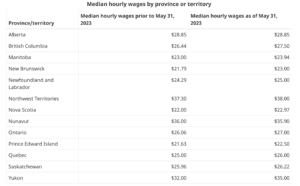Median hourly wages in all provinces and territories (except for Nunavut) will increase after May 31st.
Employers in Canada who are hiring foreign nationals use the provincial and territorial median hourly wage to know the requirements they must meet for the Temporary Foreign Worker Program (TFWP).
The location of the position and the wage being offered to the employee will determine if employers need to apply for a Labour Market Impact Assessment (LMIA) under the stream for high wage or low wage positions, each with their own requirements.
If the employee is being paid under the provincial/territorial median wage, they are considered low wage, and if they are being paid at or above the median, they are considered high wage.
What is the Temporary Foreign Worker Program?
The TFWP allows Canadian employers to hire foreign nationals to fill labour shortages in Canada. Employers looking to hire under the TFWP need to complete the Canadian government’s labour market test, the Labour Market Impact Assessment (LMIA). The LMIA ensures that there will be a positive or neutral impact on the Canadian labour market if the employer hires the foreign worker.
MIA and a temporary work permit are required before a foreign national can begin working for the Canadian employer through the TFWP.
If you are looking to hire a high wage worker, you must submit transition plans along with the LMIA that ensures you are taking the steps as an employer to reduce your reliance on foreign workers over time. This ensures that qualified Canadians are given priority for available jobs.
If you are looking to hire a low wage worker, you do not need to submit a transition plan along with the LMIA. Instead, the Canadian government puts a cap on the number of low wage workers that a business can employ in order to restrict access to the TFWP.
If you are an employer offering a wage that is below the provincial/territorial median, you must:
- Pay for round-trip transportation for the temporary foreign worker;
- Ensure affordable housing is available;
- Pay for private health insurance until workers are eligible for provincial health coverage;
- Register the temporary foreign worker with the provincial/territorial workplace safety board; and
- Provide an employer-employee contract.
Finally, the application will be reviewed by Employment and Social Development Canada (ESDC), and officials will need to determine that no qualified Canadians are being overlooked in favour of the foreign worker.

